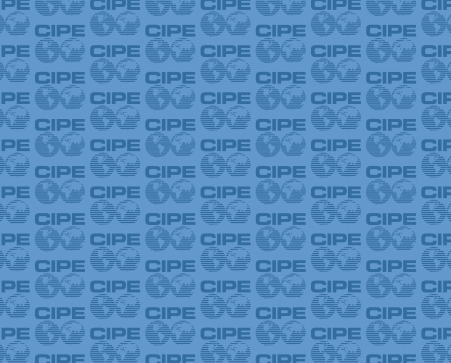
The political and economic climate in Venezuela has become increasingly hostile for entrepreneurs and the private sector since 1998, when Hugo Chávez became president and ushered in his “Bolivarian Revolution” — a series of sweeping economic and political changes aimed at helping the poor which instead led to high inflation, shortages of basic goods, and the growth of a large informal sector.
Moreover, Chávez frequently accused the private sector of conspiring with the CIA, the domestic opposition, the Colombian government, and other actors to topple his presidency and the Bolivarian Revolution. The resulting social and political cleavages among Venezuelans have become so strong that political disagreements have even created bitter feuds among family members.
Since 2013, CIPE has been working with the Federation of Chambers of Commerce and Production (FEDECAMARAS) to strengthen the capacity of local entrepreneurs and promote the values of democracy and free market initiative in Venezuela. FEDECAMARAS is a private, non-profit civil association with over 250 business association members encompassing 13 business sectors and 23 regional state chambers. Despite the hostile political and economic climate that took root under Chávez and has persisted under his successor Nicolás Maduro, FEDECAMARAS has worked tirelessly to strengthen the Venezuelan business climate through the principles of economic freedom and democracy.
The centerpiece of CIPE’s project with FEDECAMARAS is a program called “Learning to Be an Entrepreneur.” Through this initiative, 94 entrepreneurs from the Venezuelan states of Lara, Trujillo, and Zulia receive training in entrepreneurship, innovation, and business model development. The participants come from a variety of industries, including professional services, trade, sales, and design.
An impressive 61 percent of the participants are women, which is a notable achievement for a country in which the concept of machismo (male dominance) has strong roots. After receiving their training and connecting with other entrepreneurs, participants prepare to inaugurate a local Entrepreneurship Club in their city of origin. To date, Entrepreneurship Clubs have been established in Caracas, Maracay, Valencia, Barquisimeto, Valera, and Maracaibo, and have brought together nearly five hundred entrepreneurs.
During a visit to Washington, DC, FEDECAMARAS president Jorge Roig met with CIPE staff to reflect upon the seventieth anniversary of FEDECAMARAS and to discuss the current political and social climate in Venezuela. Roig emphasized that a key element of FEDECAMARAS’ work is to show Venezuelans that the private sector, far from being the cause of Venezuela’s economic problems (a perennial accusation in the government’s discourse), can play an important role in alleviating Venezuela’s economic woes.
While recognizing that it can be challenging for Venezuela’s private sector to maintain productivity given restrictive legislation, Roig observed that entrepreneurs welcome challenges and devise innovative solutions during times of crisis. Moreover, because both Chávez and Maduro have attempted to portray entrepreneurs in a negative light, FEDECAMARAS has also worked to dispel unfavorable images of entrepreneurs among Venezuelans. While the Venezuelan government has tried to characterize entrepreneurs as cold, detached, and self-centered, the reality is that entrepreneurs pay close attention to the people around them and cannot be successful by thinking only about their own needs; rather, they need to be agents of change and work to improve the wellbeing of their communities.
Roig affirmed that in Venezuela, true entrepreneurs have understood that a sense of social responsibility is not only a necessity, but a good business practice. Thus, entrepreneurs can play an important role in the effort to strengthen democracy and respect for human rights in Venezuela in addition to stimulating economic growth in the country.
The eight-part interview that Jorge Roig held with CIPE staff during his visit to Washington, DC is available on YouTube with English subtitles and in the original Spanish.
Kevin Gatter is a Program Assistant for Latin America & the Caribbean at CIPE.
Published Date: November 21, 2014